
The Moody Blues were an English rock band formed in Birmingham in May 1964. The band initially consisted of drummer Graeme Edge, guitarist/vocalist Denny Laine, keyboardist/vocalist Mike Pinder, multi-instrumentalist/vocalist Ray Thomas, and bassist/vocalist Clint Warwick. Originally part of the British beat and R&B scene of the early–mid 1960s, the band came to prominence with the UK No. 1 and US Top 10 single "Go Now" in late 1964/early 1965. Laine and Warwick left the band by the end of 1966, being replaced by guitarist/vocalist Justin Hayward and bassist/vocalist John Lodge. They embraced the psychedelic rock movement of the late 1960s, with their second album, 1967's Days of Future Passed, being a fusion of rock with classical music that established the band as pioneers in the development of art rock and progressive rock. It has been described as a "landmark" and "one of the first successful concept albums".

A Night at Red Rocks with the Colorado Symphony Orchestra is a live album by The Moody Blues, recorded from a live performance at the Red Rocks Amphitheatre on 9 September 1992. This performance was the first time The Moody Blues performed in concert backed by a full orchestra. The concert was held in celebration of the 25th anniversary of their second album, Days of Future Passed, which had featured the London Festival Orchestra. The full video of this concert was broadcast as a fundraising broadcast for PBS in the United States.

David Justin Hayward is an English musician. He was the guitarist and frontman of the rock band the Moody Blues from 1966 until that group's dissolution in 2018. He became the group's principal vocalist and its most prolific songwriter over the 1967–1974 period, and composed several international hit singles for the band.
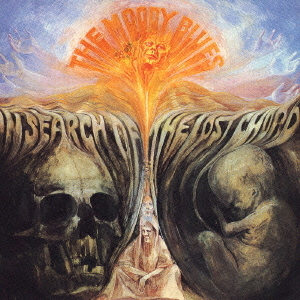
In Search of the Lost Chord is the third album by The Moody Blues, released in July 1968 on the Deram label.

"Nights in White Satin" is a song by the Moody Blues, written and composed by Justin Hayward. It was first featured as the segment "The Night" on the album Days of Future Passed. When first released as a single in 1967, it reached number 19 on the UK Singles Chart and number 103 in the United States in 1968. It was the first significant chart entry by the band since "Go Now" and its recent lineup change, in which Denny Laine and Clint Warwick had resigned and both Hayward and John Lodge had joined.

John Charles Lodge is an English musician, best known as bass guitarist, vocalist, and songwriter of the longstanding rock band the Moody Blues. He has also worked as a record producer and has collaborated with other musicians outside the band. In 2018, Lodge was inducted into the Rock and Roll Hall of Fame as a member of the Moody Blues.

Prelude is a 1987 compilation album by the Moody Blues consisting of tracks from 1967–1968, all but one of which were not included on albums.
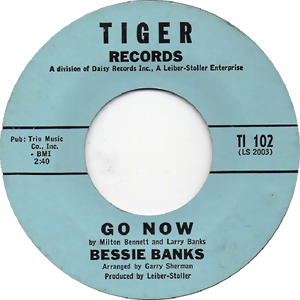
"Go Now" is a song composed by Larry Banks and Milton Bennett and first recorded by Bessie Banks, released as a single in January 1964. The best-known version was recorded by the Moody Blues and released the same year.

This Is The Moody Blues is a two LP compilation album by the Moody Blues, released in late 1974 while the band was on a self-imposed sabbatical. Though all of the songs were previously released on albums, several of them are heard here in distinctly different mixes. Like the Moody Blues albums of the time – but unlike most compilation albums, including later Moody Blues compilations – the songs on this album segue seamlessly, without silence between tracks. On the original LP, this was true of the songs on each side; when the album was remastered for CD, each disc was also blended, so that "Legend of a Mind" segues into "In the Beginning", and "Watching and Waiting" segues into "I'm Just a Singer ".

"Ride My See-Saw" is a 1968 single by the English progressive rock band the Moody Blues. It was written by the band's bassist John Lodge, and was first released on the Moody Blues' 1968 album In Search of the Lost Chord. It was the second of two singles from that album, the other being "Voices in the Sky".

"Never Comes the Day" is a 1969 single by the progressive rock band the Moody Blues. It was written by band member Justin Hayward, and was the only single released from their 1969 album On the Threshold of a Dream.
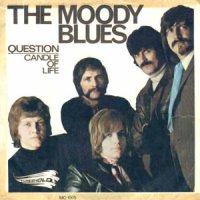
"Question" is a 1970 single by the English progressive rock band the Moody Blues. It was written by guitarist Justin Hayward, who provides lead vocals. "Question" was first released as a single in April 1970 and remains their second highest-charting song in the UK, reaching number two and staying on the chart for 12 weeks. The song reached number 21 on the Billboard Top 40 in the USA. It was later featured as the lead track on the 1970 album A Question of Balance. The single also features the song "Candle of Life" on its B-side, which was from the Moody Blues' previous album To Our Children's Children's Children.
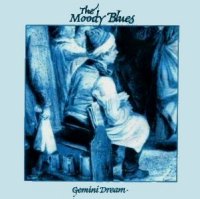
"Gemini Dream" is a song written by Justin Hayward and John Lodge that was released by The Moody Blues on their 1981 album Long Distance Voyager and also as the lead single from the album. It reached number 12 on the US Hot 100, as well as number 1 on the Canada RPM Top 100 Singles chart. It ranked as the 28th biggest Canadian hit of 1981.
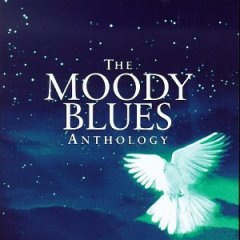
Anthology is a compilation album by the progressive rock band the Moody Blues. It was released in the US on 20 October 1998. It was not released in the UK until 2001 under the title The Collection with different artwork but with the same tracks as the US release.
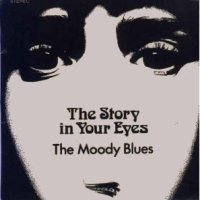
"The Story in Your Eyes" is a 1971 hit single by the English rock band the Moody Blues. Written by the band's guitarist Justin Hayward, it was first released as a single with "My Song" on the B-side, and then on the 1971 album Every Good Boy Deserves Favour shortly after.

Greatest Hits is a compilation album by the progressive rock band the Moody Blues, released in 1989. The band recorded new versions of "Isn't Life Strange" and "Question" with orchestration by the London Symphony Orchestra. The arrangements were overseen by Anne Dudley, who also produced the recordings with Justin Hayward and John Lodge. In 1990, only a year after its original release, the album was re-released as Legend of a Band: The Story of the Moody Blues with different artwork to coincide with the release of the home video documentary of the same name.

Lovely to See You: Live is a two-disc live album by The Moody Blues. Released on 15 November 2005, Lovely to See You: Live was recorded at a performance at the Greek Theater in Los Angeles, California. The album is named after The Moody Blues song "Lovely to See You", from their 1969 album On the Threshold of a Dream. Unlike the Moody Blues' two previous live albums A Night at Red Rocks with the Colorado Symphony Orchestra and Hall of Fame, Lovely to See You: Live does not feature a live orchestra. It is also their first live album since Ray Thomas retired due to health issues.

Michael Thomas Pinder is an English musician. He is a founding member and the original keyboard player of the rock group the Moody Blues. He left the group following the recording of the band's ninth album Octave in 1978. Pinder is especially noted for his technological contribution to music. In 2018, he was inducted into the Rock and Roll Hall of Fame as a member of the Moody Blues. He is the last surviving member of the group's original lineup.

Voices in the Sky: The Best of The Moody Blues is a greatest hits compilation for The Moody Blues, released in 1984.
"A Simple Game" is a 1968 song by the progressive rock band the Moody Blues. Written and sung by Mike Pinder, it was released as a non-album B-side to "Ride My See-Saw", a track from the album In Search of the Lost Chord. The song was produced by Tony Clarke and arranged by Arthur Greenslade. The track was covered by The Four Tops, and their version was issued as a single in the United States in January 1972, reaching #90 on the Billboard Hot 100. The song had already been issued as a single in Britain in September 1971, having reached #3 in the UK and #14 in Ireland.



















